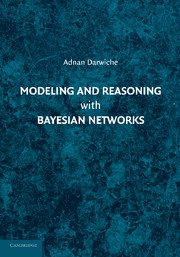Description
Modeling and Reasoning with Bayesian Networks
Author: Darwiche Adnan
This book introduces the formal foundations and practical applications of Bayesian networks.
Language: English
Subject for Modeling and Reasoning with Bayesian Networks:
Approximative price 73.88 €
In Print (Delivery period: 14 days).
Add to cart
Modeling and Reasoning with Bayesian Networks
Publication date: 08-2014
Support: Print on demand
Publication date: 08-2014
Support: Print on demand
Approximative price 123.79 €
Subject to availability at the publisher.
Add to cart
Modeling and reasoning with Bayesian networks
Publication date: 04-2009
562 p. · 17.8x25.4 cm · Hardback
Publication date: 04-2009
562 p. · 17.8x25.4 cm · Hardback
Description
/li>Contents
/li>Biography
/li>
This book is a thorough introduction to the formal foundations and practical applications of Bayesian networks. It provides an extensive discussion of techniques for building Bayesian networks that model real-world situations, including techniques for synthesizing models from design, learning models from data, and debugging models using sensitivity analysis. It also treats exact and approximate inference algorithms at both theoretical and practical levels. The treatment of exact algorithms covers the main inference paradigms based on elimination and conditioning and includes advanced methods for compiling Bayesian networks, time-space tradeoffs, and exploiting local structure of massively connected networks. The treatment of approximate algorithms covers the main inference paradigms based on sampling and optimization and includes influential algorithms such as importance sampling, MCMC, and belief propagation. The author assumes very little background on the covered subjects, supplying in-depth discussions for theoretically inclined readers and enough practical details to provide an algorithmic cookbook for the system developer.
1. Introduction; 2. Propositional logic; 3. Probability calculus; 4. Bayesian networks; 5. Building Bayesian networks; 6. Inference by variable elimination; 7. Inference by factor elimination; 8. Inference by conditioning; 9. Models for graph decomposition; 10. Most likely instantiations; 11. The complexity of probabilistic inference; 12. Compiling Bayesian networks; 13. Inference with local structure; 14. Approximate inference by belief propagation; 15. Approximate inference by stochastic sampling; 16. Sensitivity analysis; 17. Learning: the maximum likelihood approach; 18. Learning: the Bayesian approach; Appendix A: notation; Appendix B: concepts from information theory; Appendix C: fixed point iterative methods; Appendix D: constrained optimization.
Adnan Darwiche is a Professor in the Department of Computer Science at the University of California, Los Angeles.
© 2024 LAVOISIER S.A.S.

